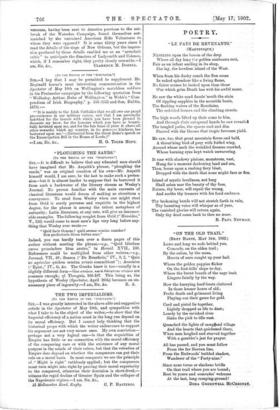"PLOUGHING- THE SANDS."
(TO THE EDITOR OP THE "SPECTATOR.")
SIR,—It is difficult to believe that any educated man should have imagined that Mr. Asquith's phrase, "ploughing the
sands," was an original creation of his own—Mr. Asquith himself would, I am sure, be the last to make such a preten- sion—but it is almost harder to suppose that he borrowed it from such a backwater of the literary stream as Wesley's Journal. No person familiar with the main currents of classical literature would dream of making so circuitous a conveyance. To steal from Wesley when one might steal from Ovid is surely perverse and exquisite in the highest degree, for the phrase is among the tritest metaphors of antiquity; Latin literature, at any rate, will give us innumer- able examples. The following couplet from Ovid (" Heroides," V., 116) would come to most men's lips very long before any- thing that Wesley ever wrote :- " Quid facie Oenone? quid arenas semina mandas ? Non profecturis litora bubus aras."
Indeed, you can hardly turn over a dozen pages of this author without meeting the phrase,—e.g., " Quid bibulum
curvo proscindere litus aratro," in Herald. XVII., 139.
References could be multiplied from other writers,—e.g., Juvenal, VU, 49 ; Seneca ("De Beneficiis," IV., 9, 2, " Quia ne agricolae quidem Bernina avenis committant "); Ausonius (" Epist.," IV., 4), &c. The Greeks knew it too—usually in a slightly different form—nwo al:14E1y, ;carte OciAarrocY 171:140EIY are common enough; cf. Theognis, 106-107. This being so, the hypothesis of Wesley (Spectator, April 26th) becomes an un- necessary piece of ingenuity.—I am, Sir, &c. R. A.






































 Previous page
Previous page